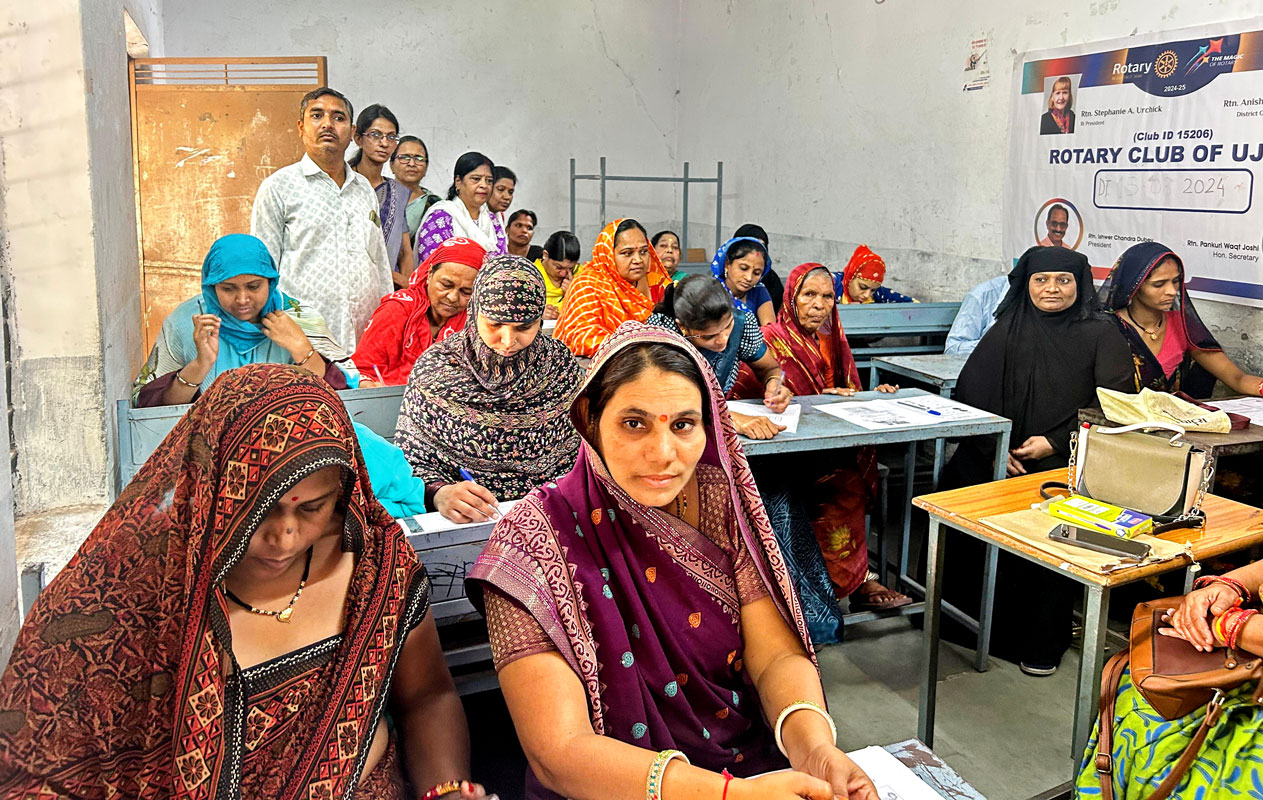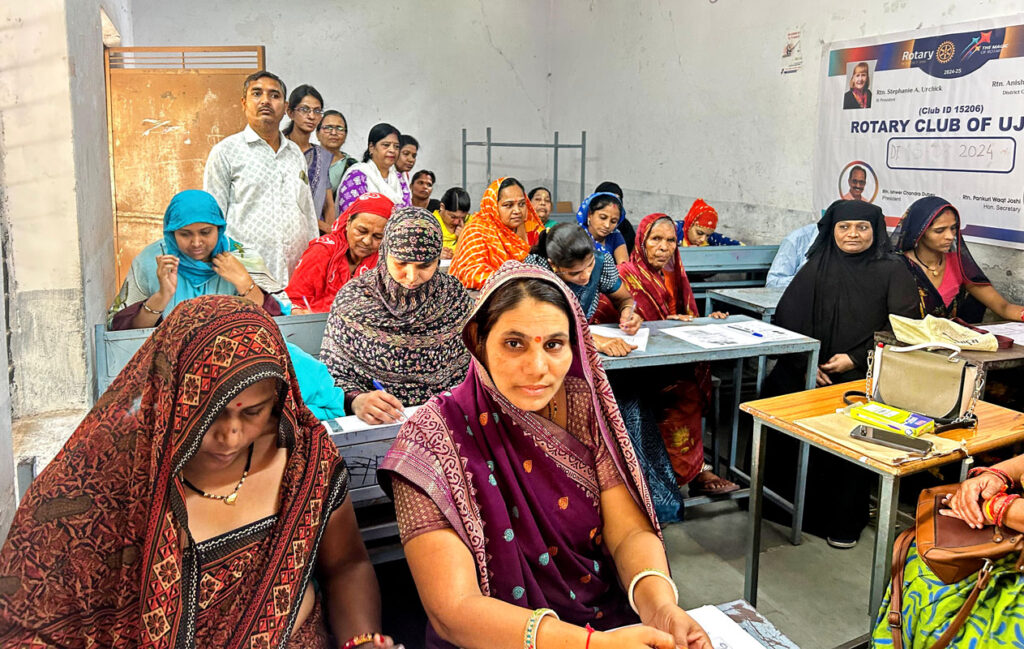In a massive bid to address the huge problem of adult illiteracy in Madhya Pradesh, where the 2011 census put the number of adult illiterates at 1.07 crore, Rotarians across the state, led by RID 3040 (MP has four Rotary districts), have been working with the state government agencies addressing illiteracy.

In this district PDG Ravi Langer and his wife Nalini, the latter a retired professor of chemistry, and district governor Anish Malik have been passionately and diligently working along with government agencies and programmes such as the Rashtriya Shiksha Kendra (RSK), Ullas Navbharat Literacy etc, in a bid to make a huge dent on the adult illiteracy numbers in the state.
DG Malik said that his district had recently conducted in Ujjain an intercity meet focusing on Rotary’s core areas of community service and literacy. “We are working with the state government and supporting the movement to eradicate adult illiteracy in our state. Our programme was attended virtually by the MP chief minister Mohan Yadav.”
Rotary ka kaam hai sarkar ko asarkar karna (Rotary’s job is to make the government effective)!
— PDG Ravi Langer
Addressing the meet and welcoming Rotary’s ongoing partnership with the state’s education department, the CM said Rotary members would join hands with the state’s functionaries and this joint effort will help to pull more and more adults out of illiteracy. As more people become literate, they will become more aware of their rights, and work together to take the state to higher levels of development.
PDG Langer said that to make over 1 crore adults literate, the total budget earmarked is ₹1,000 crore, of which ₹700 crore will come from the Centre and ₹300 crore from the state government. On its part, the Rotarians associated with this adult literacy programme have printed and made available 10,000 Akshar Pothis (literacy handbooks) for which the blueprint has been provided by the MP government.
DG Malik added that the Akshar Pothi is an elementary, basic education textbook for those who are totally illiterate. “There was a lot of demand for it and the copies were running short as the government was not able to print the required numbers in a short time. So we in Rotary have undertaken the responsibility for printing and making available one lakh Akshar Pothis. Of these, 10,000 books planned for phase one have already been given for distribution in 23 districts of MP that come under RID 3040.”

There are several ways in which illiterate adults are made literate, but the basic common thread is the Akshar Saathi or the young companion who undertakes to give the gift of literacy to one person… in a kind of each-one-teach-one programme.
At the Ujjain meeting CM Yadav acknowledged Rotary’s cooperation in the UNLP, and drawing a parallel with polio, said that just as with Rotary’s help polio was eradicated in India, similarly he hopes the literacy programme of the state would be successful. “We hope that Rotary, along with other NGOs working with us, will become our Akshar Saathis in converting over 1.07 crore adult illiterates in MP to literate citizens. Students in both government and private schools are helping the government in this task,” he added.
Giving details of the GoI’s literacy programme, which hopes to attain cent per cent literacy, he added that under this campaign those above 15 years in both urban and rural areas, who had missed getting formal or school education, would be made literate with the help of young volunteers.
There was a lot of demand for the Akshar Pothis; the copies were running short as the government was not able to print them in a short time. So Rotary printed and made available 10,000 books in the first phase.
— DG Anish Malik
DG Malik said that in September, under this programme, literacy tests targeted at 25 lakh candidates were conducted in 52 districts of MP. Over 9.3 lakh participated in it and 8.55 lakh were successful and given certificates. “I myself visited a few centres and it was a wonderful sight to see so many adults enthusiastically participating in the tests which were held at the Navbharat Chetna Kendras.”
PDG Langer said the Rotarians were both touched and impressed to see daughters, daughters-in-law, and other female relatives accompanying their elder female relatives who were appearing for the test to get a certificate of basic literacy. Asked about the number of women candidates, he said, “I am not sure about the exact numbers, but I can tell you that there were many more women than men who took this test at the various centres. We were happy to see so many students helping in this endeavour and thus becoming literacy ambassadors.”
He added that students from Class 9 to 12 were enthusiastically participating in the programme to pull out from the dark shadows of illiteracy the adult illiterates in their neighbourhoods.

RC Ujjain, of which Langer is a member, is keenly involved in this literacy project, and he is hopeful that with the help of his club president Ishwar Chand Dubey and secretary Pankhuri Joshi, and future club leaders, “we will be able to successfully convert over one crore illiterates in our state into literates by 2030. It doesn’t matter if it takes one or two years more; but we are confident we will achieve this goal.”
Langer explains that the UNLP is a programme under the national education policy which is aiming for total literacy in India by 2030. The programme is being implemented through the Rashtriya Shiksha Kendras (RSK) which have teachers and students within its ambit. The idea is to use the teachers and students who are there in the education system across the country; about 70 per cent of the students are in government schools and only 30 per cent in private schools. The government school students are crucial because most of the adult illiterates come from their neighbourhoods, and hence they can play a crucial role in motivating and teaching them some basic literacy. “It is actually the youth of India who are mostly worried about the prevalent illiteracy in the country, and want to do something about it as the future of India is at stake. So students, particularly those who are already in organised groups such as the NSS, NCC and so on, are really useful when it comes to teaching adult illiterates,” he adds.

He recalls that about four years ago, the director of the RSK was an IAS officer named Raju, who was close to him. “He was a simple man and would come to my office and we helped in formulating the basic literacy policy for adult illiterates.”
In this scenario, Rotary plays a key role in several aspects, particularly to identify, encourage, motivate and support those government officers who are really interested in carrying forward the adult literacy mission. As DG Malik points out, Rotarians are constantly on the lookout for those teachers, students and government officials who are working hard in this programme, and they use their clout or persuasive power to tell the district officers to recognise such people with an award or certificate during important events such as Independence or Republic Days.
Langer puts it in a nutshell when he says, “Rotary ka kaam hai sarkar ko asarkar karna (Rotary’s job is to make the government effective)!






